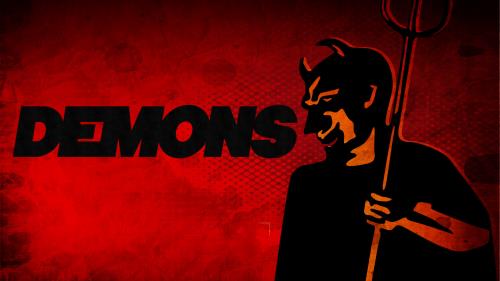-
Twenty-First Century Demons Series
Contributed by The Rev Deniray Mueller on Feb 3, 2018 (message contributor)
Summary: we must fight the demons of the 21st century
Dear Lord, may we listen with our ears, hear with our hearts, and be willing to carry out your mission. Amen.
In the passage from Mark that was read today, Jesus was teaching at the synagogue in Capernaum. It was the first time his newly chosen disciples had heard Jesus teach, and they, along with everyone else present, were amazed with the authority – the clarity – of what Jesus said. He did not speak like a scribe, parroting the scriptures, but as one who understood their meaning in a new and deeper way.
Then suddenly this crazy man starts shouting
“Are you here to destroy us? I know who you are, you the Holy one of God." (Mark 1:24)
Now here at Saint John’s we know what would happen if such a thing occurred. Ushers would scramble and get this demon-possessed crazy man out of here. We would all shift uncomfortably in our seats and roll our eyes at this poor crazy person who dares upset our solemn service.
But not Jesus,
no indeed.
He just said:
Be silent, and calm down!" (Mark 1:25)
And caused the demons to leave him.
To me there are several observations we can make about this event.
First of all, from the very beginning of His ministry, Jesus spoke new things, unlike anyone had heard before: about the Hebrew law, about how people should love and treat one another, about priorities and what’s important in life. And he spoke and taught as the Primary Source, not a mere commentator: He talked about unconditional love, about a classless and egalitarian society where all care for one another, an all-inclusive, all sharing world without master or slave, Christian or Jew, male or female, rich or poor (as we hear in Galatians 3:28) – it was radical then, and is radical now!
Secondly, Jesus showed early on the amazing, unworldly, God-like power He had to heal the sick, make the blind to see, change water to wine, cast out mental illness – all actions, then and now, beyond this world. All bigger than any mortal.
Thirdly, this crazy man really ‘got’ it. Of all the observers in the synagogue, he realized Jesus was the Son of God come here to ‘destroy us’ – that is, to change us, transform us, and make us new.
So what has this to do with you and I today in the twenty-first century?
To answer that question, at least in part, I want to share some ideas and facts I learned this past weekend as I attended, via live streaming, the Trinity Institute from Trinity Wall Street in New York City. It was a two and a half day seminar entitled ‘Creating the Common Good’. In reality, it was an in-depth look at economic inequality in our country and in much of the so-called western world: the income gap between the upper 20% and the lowest 20%, which we euphemistically call the ‘poor’.
What is economic inequality?
It is the oppression placed on our global world that creates an environment in which some people suffer, do not have sufficient nutrition or even enough to eat, receive sub-standard or no education, are restricted from voting, receive inadequate or no healthcare, fall prey to drug pushers, pimps and traffickers; they are demeaned through white privilege and inhumanity based on race, ethnicity, gender, sexual orientation or social status. People, who, no matter how hard they try, fall deeper and deeper into the pit of poverty, despair and oppression. And despite more and more wealth being created for some, this gap between the ultra-wealthy and the working poor grows wider and wider.
There are many reasons for this, but a significant one is that we have a crisis of leadership, both governmental and, often, ecclesiastical – everyone seems to be for sale to the highest bidder. Our leaders seem accountability to no one except those who fund them. There is no transparency as to where the money comes from or how the money is spent. Rules on the financial markets and banks have been deregulated so much that these institutions have now become ‘too big to fail’. And are the instruments of greed for a very few billionaires.
Such inequality results in destructive ideologies, encouraging comparisons between individuals, delusions of entitlement (at both ends of the social and economic spectrum), and a slow but sure move toward a totalitarian government in which those in power have no regard for the rest of us.
We hear from politicians and some clergy a myriad of proposed solutions to this inequality –blaming a certain sector of society, such as the last/lost/least, ‘the other party’, socialism, fascism or greed. Everyone wants to point the finger at someone else so they don’t have to take responsibility for their own complicity in our unequal, rigged system.

 Sermon Central
Sermon Central



